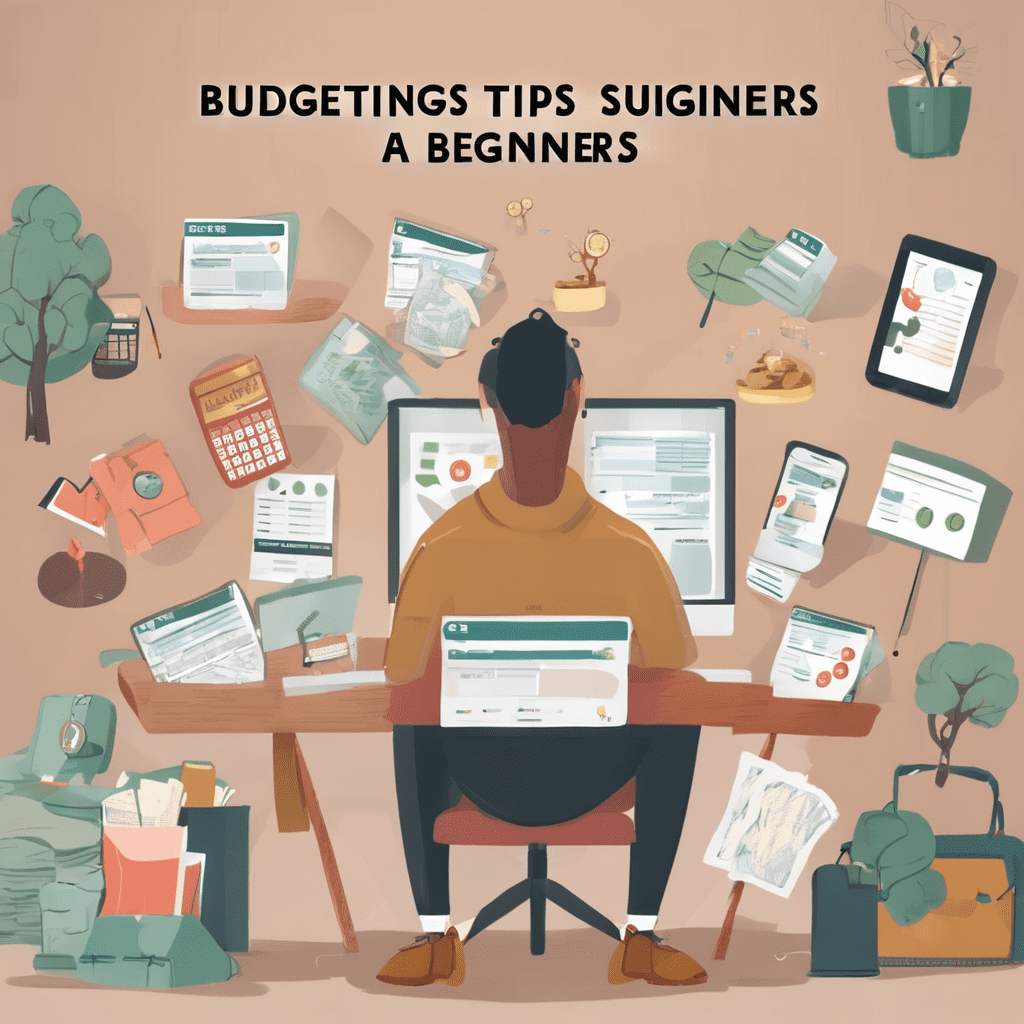Introduction
Budgeting for Beginners Made Easy
Table of Contents
In truth, budgeting for beginners is not really that difficult or complicated as well. Here in this 2024 edition guide we are going to explain what you need to know and understand in relation to budgeting and how it’s going to help you chart a good financial course. Saving money whether for a particular purpose, clearing a financial obligation or simply to grasp the flow of money is what this guide is all about.

Why Budgeting for Beginners is Crucial in 2024: Backed by the Numbers
A budget is not a number in a checklist; it is a guiding tool that brings you closer to your vision in life. Here’s why mastering budgeting for beginners is a game-changer, backed by compelling data:
1. Gain Financial Clarity:
- See the Big Picture: According to research done by NEFE, only 32 percent of American individuals prepare a detailed household budget. Imagine what an increased financial clout is like when you are in the minority of people who understand where their money goes.
- Identify Spending Patterns: Research done shows that those who budget save about ten percent more than those who do not. A budget allows you to see where “the money is dripping through cracks” and put the stopper in.
- Make Informed Decisions: The results of the financial plan already show a positive correlation: if a person has a written financial plan, then they feel financially secure at a level 78%, while those who have no such plan – only 42%.
2. Achieve Your Goals:
- Prioritize Savings: Budgeting has been shown to increase savings ratios considerably . In one survey, those who claimed to budget mentioned that they managed to raise their savings by 20%.
- Pay Off Debt: A clear debt repayment plan with the least dragging of the financial capacity to the budget can pay off many debts in a shorter period. Bankrate revealed that while 53% people have a budget, they are able to meet all of their payments in time.
- Build Wealth: This means that just as investments are important for wealth creation in the long term, the pathways into well-structured budgetary processes are also important for wealth creation in the longer terms.
3. Reduce Stress and Anxiety:
- Take Control: New studies show that as many as 72% of Americans admitted to experiencing stress when it comes to money at least occasionally, American Psychological Association. In order to reduce that stress, a budget can provide you with the weapons.
- Sleep Soundly: According to the study conducted by Northwestern Mutual, 44% of Americans are losing sleep over money matters. A budget can offer us assurance and may also help to enhance our ability to have a good night’s sleep.
- Make Confident Decisions: In a survey conducted by Debt.com, only 32 percent of those asked felt more stressed about money once they started budgeting.
4. Build a Solid Financial Foundation:
Prepare for the Unexpected: That is why, according to a study conducted at the Federal Reserve, 40 percent of Americans cannot come up with $400 to meet an emergency. Emergency fund is the safety net that the budget with the allowance for it can be.
Create Long-Term Security: Budgeting is the foundation of financial security for expenses today and for the future and the creation of your personal dream.
Leave a Legacy: Managing your budget effectively means that you can leave your loved ones with good means as bequests.
These statistics show how much budgeting can influence your financial health. It is thus a tool that makes you regain control of your financial future and helps you achieve goals and lead an improved life.
Budgeting for Beginners: Your Step-by-Step Action Plan
Follow these steps to create a budget that works for you:

- Calculate Your Income:
- Gather Your Paystubs: Again, if the business has employees on payroll, start with their gross amount if it’s monthly or weekly basis.
- Factor in Other Income: Do not forget about the side jobs, freelance jobs, investments or any other income you receive usually.
- Calculate Net Income: This is your taxable income less taxes and other deductions that you have to meet before necessarily getting to your pocket.
2.Track Your Expenses: Unveiling Your Spending Habits
According to the Consumer Financial Protection Bureau (CFPB), the best approach is keeping track of every dime you spend. Any of these tools are helpful: a budgeting app, spreadsheet, or even a notebook.Since it’s critical to have visibility into all of the money leaving your bank account, you should keep track of each and every purchase you’ve made, from that $5 cup of coffee to your $1000 monthly rent. This is probably one of the most important practices that most of us neglect as we begin towards achieving a financially secure life.
Your Arsenal of Tracking Tools:
Harness the power of technology or embrace a simple pen-and-paper approach.
Budgeting Apps: Extend that service to include process automation, categorization, and reporting, and compared to Mint, YNAB, and similar tools.
Spreadsheets: Excel or Google Sheets are versatile as they allow the user to modify his or her tracking system.
Notebook: A notebook is one of the simplest tools of expense tracking since it allows writing down each expenditure immediately.
Categorize for Clarity:
Divide your expenses into distinct categories for a clear picture of your spending patterns:
- Divide your expenses into distinct categories for a clear picture of your spending patterns:
- Needs: The necessary and.Shared fixed cost.Standard variable costs such as rent, power, food, fuel/light bill, and medical expenses.
- Wants: Non-essential expenses that include; eating out, entertainment, subscriptions, hobbies, etc.
- Savings and Debt: Expense categories for savings to fund specific goals, having an emergency fund, and repaying debts.
Unlocking the Power of Tracking:
By diligently tracking and categorizing your expenses, you’ll uncover valuable insights:
- By diligently tracking and categorizing your expenses, you’ll uncover valuable insights:
- Identify Spending Leaks: Identify some places where you may be losing your money unconsciously.
- Optimize Your Budget: Understand which areas to reduce spending and which one require an increase in spending.
- Empower Financial Decision-Making: Armed with clear knowledge of how your spending habits presents itself financially, you can make better and confident decisions.
- For more guidance and helpful resources to better track repossession steps, please visit the CFPB for more information and resources.
For further guidance and tools to streamline your tracking process, explore the comprehensive resources offered by the CFPB.
- Set Realistic Financial Goals:
- Dream Big, Start Small: People are encouraged to have lofty objectives, but it is always appreciated when a person sets realistic objectives.
- Be Specific: Do not say ‘save money,’ but say ‘save $500 a month for down payment’.
- Make it Measurable: You should monitor your progress toward your goals for motivation purposes.
- Create Your Budget:50/30/20 Rule: 50 percent on the necessary items, 30 percent on those, which aren’t really required but are useful, and 20 percent from savings or debts.
- Envelope System: Divide the cash amount to be spent into various categories into various envelopes.
- Zero-Based Budgeting: Spend every dollar according to a planned goal until your net income equals to your total expenses.
- Allocate Your Income: Dedicate one part of your income towards each of the categories depending on your objectives and requirements.
- Leave Room for Flexibility: Emergencies occur and should be saved for in an emergency fund.
Review and Adjust Regularly:
- Celebrate Wins: :Congratulations, give yourself some credit and always strive to ensure that you achieve even better results than previously achieved.
- Make Adjustments: Expectation is a change in life, and there is a need to change the budget too. If you see that your income increased or your expenses decreased, change your budget.
- Monthly Check-Ins: _month is enough to review your budget so you know how you are progressing.
Additional Tips:
- Don’t Give Up: Budgeting takes practice. I will also advise you that don’t get it right the first time, it is okay.
- Automate Savings: Organize yourself to save money without feeling the pinch by arranging for direct debit of your savings account.
- Use Budgeting Tools: There are many different applications and programs that can simplify the work of budgeting. Seek Help if Needed: If that is the case, perhaps it is a good idea to consult a financial advisor.
Budgeting Tips for Beginners: Your Path to Success

These tips will help you navigate the world of budgeting with confidence:
These tips will help you navigate the world of budgeting with confidence:
Start Small:
Don’t Overcomplicate: Start with a basic one where you only take into account the arriving and outgoing funds (income, 3-4 big expenditures, and desired savings).
Gradual Progress: However, one can add more details and other categories of the web links as he/she slowly gains experience on the process.
Avoid Burnout: Diligent record keeping begins with aiming at tracking every dollar right from the start of the business. Take the baby steps and progress gradually.
Be Honest with Yourself:
No Sugarcoating: Never underestimate your miscellaneous spending such as eating out, entertainment and other unnecessary expenses.
Track Everything: They help to accumulate the results each over a given period. Make sure you keep good records of all your expenses.
Face the Facts: The first way to stop what you’ve been doing is to admit you have a problem, and this comes to how you are spending your money.
Celebrate Small Wins:
Acknowledge Progress: Every day that you have strictly followed your budgets, on reaching a certain level of savings or paying off your dues, then be proud of yourself!
Reward Yourself (Within Reason): It is crucial to reward motivation and maintain those more positive methods with a little refresher or token reward.
Stay Motivated: Tracking progress works to build the morale of an individual and help them to focus on meaning goals that are realistic in the process.
Seek Support:
Talk to Friends and Family: Talk your plan and objectives with other people who will help and encourage you in the accomplishment of the goals.
Join Online Communities: Get in touch with other wannabe mineral rich individuals who are also learning the art of budgeting.
Consult a Financial Advisor: In case you are overloaded or require particular guidance, it is important that you consult a professional.
Additional Tips for Beginners:
- Use Cash: Also you feel that paying with cash helps to be more conscious about your expenditures.
- Avoid Emotional Spending: Find out stimulus factors that cause impulse buying and find out how to control them.
- Automate Savings: To ensure you save money automatically create an automatic transfer system to your savings account.
- Be Patient: Budgeting is a journey. You should not climb up to professional level immediately.
Choosing the Right Tool for You:
The best budgeting tool for you depends entirely on your personal preferences and financial situation. Here’s a breakdown of some options to consider:
- The best budgeting tool, though it depends on your personality and financial needs, is in your hands. Here’s a breakdown of some options to consider:
- Tech Savvy? If you are comfortable with using technology and appreciate using the convenience of apps, then a budgeting app is the best way to go. Most of these apps provide tools such as, auto-categorizing of transactions, receipt capturing, bill alert, and savings goals.
- DIY Enthusiast? If you like to have the reins and like the system to be more flexible, then you may find that a spreadsheet works best for you. With the help of the separate fields for income, expenses, and transfers, you can build your own budgeting system basing on the columns with the flexible formulas that will let you easily calculate any values you like, build charts and graphs according to your preferences, and generally use Budget-My-Money as a platform that opens the necessary tools and lets you manipulate with the interface.
- Need Personalized Guidance? If you feel too lost or don’t know where to begin, it might be helpful to hire a financial planner. They can be of great help in this respect especially when it comes to recommend specific financial strategies and to guide you on that budget you want to set according to your long term financial plan.
- Hybrid Approach: Most people begin to learn that, to be most effective, there are various tools that may need to be used collectively. For instance you could use an app to track your daily expenses, or use an Excel sheet to review all of your financial status.
Remember: The most important thing here is to mention that you ought to pick the tool that will be used regularly. Choose one or try out some of the available plans to observe which one best suits your daily activity and at the same time enables you to achieve your financial goals. Do not get stuck on a process as there are situations when something may not be ideal for you.
Conclusion: Your Journey to Financial Freedom
Starting on the strategy of budgeting for first timers marks the start of attaining financial control. Simply follow the strategies outlined in this article and learn how to utilize the proper tools – and you will finally get your money back on track. Important thing to remember is that the goal is to stay consistent with your budget and adhere to it.
Remember: Budgeting therefore is not a one-off activity, but a process that once embarked on, must continuously be carried out. You have to do some research, practice and understand yourself to learn what IS suits you more. Do not be disappointed when things look like they are not going the way you planned – that is normal. And that’s how you will become a budgeting guru with some effort to attempt!
